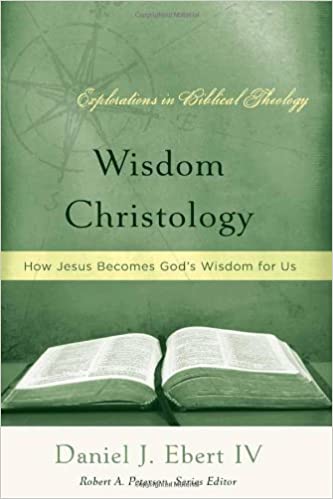A Brief Book Review from Books At a Glance
by Mark Baker
Daniel J. Ebert IV (Ph.D. Trinity Evangelical Divinity School) has provided another installment in the Explorations in Biblical Theology series edited by Robert A. Peterson. The purpose of the book is to explain “how the doctrine of Christ functioned as wisdom for the early church” (2). The book is divided into two parts: Part 1, entitled “Wisdom’s Invitation,” covers wisdom Christology in the gospels, and Part 2, “Wisdom and the Cross” covers the same theme in relevant passages in the rest of the New Testament.
Ebert presents a conceptual study, rather than a strict lexical overview. He argues that the theme of wisdom Christology can be found even in places that do not mention the word “wisdom” itself. He is also well-versed in the relevant Second Temple Jewish literature that provides relevant background information. The chapters are full of key parallels between the New Testament and Jewish literature such as Sirach and the Wisdom of Solomon.
The book concludes with a strong claim that no “attribute of God was expressed in figurative form so powerfully, and developed so thoroughly as wisdom” (175). He suggests three key areas of wisdom Christology: revelation, creation, and redemption. The first two areas have parallels in the Old Testament and other Jewish literature, whereas the redemptive quality of wisdom is found uniquely in the New Testament, specifically in 1 Corinthians 1:23-24, 30. Wisdom Christology is an “upside down wisdom,” a wisdom that does not coincide with the world’s wisdom, but rather is found primarily in the gospel and manifested in the church (103). The chapters on Paul’s letters and Hebrews were particularly insightful.
Readers may be surprised, however, to find that much of the argument focuses on debunking overly enthusiastic parallels with the “Lady Sophia” theme. I personally agree with Ebert’s point, but the consistent return to this negative argument sometimes left little room for the construction of his own argument, especially in the chapters on the Gospels. Furthermore, Ebert nearly outright rejects parallels with the Lady Sophia theme because of the differences between Lady Sophia and Christ’s wisdom. But could the New Testament authors be using the Lady Sophia theme as a foil or a polemic in order to highlight the supremacy of Christ? Could not the similarities be emphasized as a way to see the differences more clearly? These questions were left unanswered.
Because of the pages spent deconstructing the Lady Sophia motif, there was not quite enough constructive material to prove Ebert’s sweeping claim that wisdom is the most powerfully expressed figurative form in the New Testament. Nevertheless, there is still much to gain from this book. Ebert is a good writer, and there are many sections that are devotional, and illuminating. And certainly, those who are aware of the debates about Lady Sophia will find Ebert as a trustworthy guide in this field of study.
Mark Baker (PhD, Southeastern Baptist Theological Seminary) serves as professor and assistant director at the Scarborough College Darrington campus in Houston, TX.
Copyright 2021, Books At a Glance
Books At a Glance book summaries are available by subscription only and except for brief quotes may not be reproduced, in whole or in part, without express, written permission.
